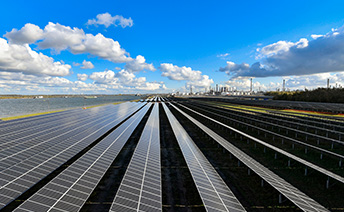International Gas Union (IGU)
IGU advocates natural gas as an integral part of a sustainable global energy system. It covers the whole gas supply chain.[1] The members of IGU are gas industry associations and companies, which together represent more than 90% of the global gas market.[2]
Membership of board/executive committee: A Shell employee is a member of the executive committee.[3]
- 2022 assessment outcome: Some misalignment
- 2021 assessment outcome: Aligned
Summary
Shell benefits from its membership of IGU, in particular from IGU’s advocacy of the benefits of gas and its role in the energy transition. IGU also participates in international forums, such as the UNFCCC Conference of the Parties.
We have found IGU to have some misalignment with our climate and energy transition-related policy positions.
We will urge IGU to:
- Support reducing methane emissions throughout the natural gas supply chain through direct regulations such as performance standards based on robust monitoring, reporting and verification frameworks. Explicitly state support for ending routine flaring by 2030 or sooner to help achieve such standards.
We will encourage IGU to:
- Explicitly state support for net-zero emissions by 2050.
- Support policies to facilitate the decarbonisation of heavy industry, including those that create demand and encourage supply of low-carbon energy in industry.
- Support improving energy efficiency through standards and regulatory instruments covering key sectors of the economy.
We will remain a member of IGU at the current time. We will continue to track alignment between IGU’s climate and energy transition-related positions and our own and will be transparent about where we find differences. We will continue to engage the association in areas where we have different views.
Further information
Click on the sections below to read more.
- IGU has stated that it “supports the Paris Agreement, Nationally Determined Contributions to reduce GHG emissions, and it is committed to the significant decarbonisation of the global energy system.”[4]
- IGU has not stated an explicit position in support of net-zero emissions, although in 2020 it signed an industry letter to EU institutions which called on them “to support ambitious and pragmatic policy tools that will enable the scaling up of all decarbonisation options which will be needed to achieve carbon neutrality by 2050”.[5]
- In a 2022 social media post, IGU stated: “It is clear that some lessons must be learnt, to address the current crisis and avoid future ones, while ensuring that countries can stay on track to fulfilling Paris climate goals as well as their pledges made at last year’s COP26.”[6]
- IGU has indicated support for carbon pricing.[7] [8] [9] IGU and Boston Consulting Group’s (BCG) 2020 report ‘Gas Technology and Innovation for a Sustainable Future’ identifies carbon pricing as a high priority action for government policy on gas technology and innovation.[10] [11] It states “government policy which supports the development of new technologies and ensures their value is recognized, using widely accepted and efficient mechanisms such as carbon pricing and emissions regulations” is needed.[12] [13]
- IGU and BCG’s 2020 report ‘Gas Technology and Innovation for a Sustainable Future’ notes that “gas technologies cannot address the gap to achieving the Paris Agreement goal in its entirety and other clean tech solutions such as renewable power and energy efficiency will also be essential.”[14] IGU does not state an explicit position in support of improving energy efficiency through standards and regulatory instruments covering key sectors of the economy.
- IGU has stated support for the role of decarbonised hydrogen, though it emphasises a strong role for blue hydrogen.[15]
- IGU’s November 2021 ‘Global Renewable and Low-Carbon Gas Report’ states that “Renewable gas and low-carbon hydrogen are two vital elements in an achievable energy transition. They will be critical for the global energy system to achieve the required levels of decarbonisation.”[16]
- The Global Gas Report 2022 – published by IGU, Snam and Rystad Energy – states that zero and low-carbon gases, like hydrogen, “will progressively play a critical role for the world to reach climate change mitigation ambitions, especially in the hard-to-abate sectors”.[17]
No position
- In 2022, IGU stated “any serious effort [to] decarbonise the energy system at a scale suitable for the Paris targets, will require clean electricity and gas, including natural gas, renewable or biogas, hydrogen, carbon capture technologies, and the necessary infrastructure to deliver this energy to people and businesses.” [18]
- The Global Gas Report 2022 – published by IGU, Snam and Rystad Energy – states that “Carbon capture, utilization and storage (CCUS) technology is projected to take on an increasingly vital role in the fight against climate change. To achieve a carbon-neutral world by mid-century, the relevance of CCUS will intensify as more and more industrial sectors commit to generating zero or negative emissions.”[19]
No position
- IGU has stated that switching to natural gas from coal or oil products is a way to immediately reduce emissions.[20] [21]
- IGU acknowledges a role for electrification and the need to decarbonise the electricity supply but does not appear to have a position in support of increasing electrification. IGU states that “electrification may not be a feasible option in some parts of the economy due to inherent structural requirements or technological limitations. This is currently the case in aviation, shipping and heavy-duty road transportation, which require energy-dense and lightweight fuels.”[22] [23]
- In December 2021, IGU released a statement on EU regulation that stated “total electrification is impracticable, and not all power generation can be renewable all the time.”[24]
- IGU has noted the role of natural gas, zero- and low-carbon gases as partners for renewable sources.[25] [26] [27] [28]
- IGU has stated support for reducing gas sector methane emissions, although it does not appear to have stated positions in support of the direct regulation of methane emissions.[29] [30] [31] In its December 2021 statement in response to the EU methane regulation, IGU stated “we agree with the conclusions of our colleagues at IOGP on the new methane regulation […] and argue that one size does not fit all. Any regulation that can be assessed as overly prescriptive, non-functional and not risk-based, especially in such a technical industry, is poor regulation.”[32]
- IGU is a supporting organisation of the Methane Guiding Principles.[33]
- IGU’s magazine, the Global Voice of Gas, included a feature on methane emissions that noted various global initiatives to tackle methane emissions (Global Methane Alliance, Oil and Gas Methane Partnership 2.0, Methane Guiding Principles, Oil and Gas Climate Initiative); it stated that the IGU “is supportive of all effective efforts and initiatives for further methane action, and what makes them effective are reduced emissions – and that is what needs to be at the heart of all policies and pathways.”[34]
- IGU has not stated a public position on ending routine flaring by 2030 or sooner.
No position
- The Global Gas Report 2022 – published by IGU, Snam and Rystad Energy – states: “Biomethane could be converted into compressed natural gas (CNG) or liquefied natural gas (LNG) to be used as a biofuel. In its LNG form, it could be used to decarbonize sectors such as heavy-duty transport and maritime sector where electrification might be challenging.”[35]
- The Global Gas Report 2022 – published by IGU, Snam and Rystad Energy – states: “Low-carbon and zero-carbon gases are critical to decarbonize heavy industry and manufacturing of vital materials.”[36] IGU does not state an explicit position in support of policies to facilitate the decarbonisation of heavy industry, including those that create demand and encourage supply of low-carbon energy in industry.
No position
- The Global Gas Report 2022 – published by IGU, Snam and Rystad Energy – states that “LNG used as a marine fuel offers notable GHG advantages over conventional fuel oil and modified diesel, while also eliminating harmful exhaust pollutants.”[37]
[1] https://www.igu.org/about/
[2] https://www.igu.org/about/
[3] A Shell employee is a member of the executive committee, but this is not a Shell-designated position.
[4] http://www.igu.org/news/igu-statement-on-the-influence-map-report/
[5] http://www.gasnaturally.eu/wp-content/uploads/2020/10/58-INDUSTRY-LEADERS.pdf
[6] https://www.linkedin.com/posts/internationalgasunion_globalvoicegas-naturalgas-coal-activity-6955961750001180672-UM0c?utm_source=share&utm_medium=member_desktop
[7] https://www.igu.org/news/the-keys-to-meeting-paris-agreement-gas-technologies-and-carbon-price/
[8] https://www.igu.org/resources/gas-technology-and-innovation-for-a-sustainable-future/
[9] www.igu.org/resources/global-gas-report-2022/
[10] https://www.igu.org/resources/gas-technology-and-innovation-for-a-sustainable-future/
[11] https://www.igu.org/news/the-keys-to-meeting-paris-agreement-gas-technologies-and-carbon-price/
[12] https://www.igu.org/resources/gas-technology-and-innovation-for-a-sustainable-future/
[13] https://www.igu.org/news/the-keys-to-meeting-paris-agreement-gas-technologies-and-carbon-price/
[14] https://www.igu.org/resources/gas-technology-and-innovation-for-a-sustainable-future/
[15] https://www.igu.org/news/multi-coloured-hydrogen-in-the-global-energy-transition/
[16] https://www.igu.org/resources/global-renewable-low-carbon-gas-report/
[17] https://www.igu.org/resources/global-gas-report-2022/
[18] https://www.igu.org/news/global-voice-of-gas-issue-5-vol-1/
[19] https://www.igu.org/resources/global-gas-report-2022/
[20] https://www.igu.org/news/igu-statement-on-the-influence-map-report/
[21] https://www.igu.org/resources/transitions-toward-clean-and-reliable-power-systems-a-case-study-from-ontario-canada/
[22] https://www.igu.org/resources/global-gas-report-2022/
[23] https://www.igu.org/resources/gas-technology-and-innovation-for-a-sustainable-future/
[24] https://www.igu.org/news/international-gas-union-statement-on-eu-regulation/
[25] https://www.igu.org/facts-figures/#sustainability
[26] https://www.igu.org/resources/global-gas-report-2022/
[27] https://www.igu.org/news/presentation-global-gas-report-2022/
[28] https://www.gasnaturally.eu/wp-content/uploads/2020/10/58-INDUSTRY-LEADERS.pdf
[29] https://www.igu.org/resources/gas-technology-and-innovation-for-a-sustainable-future/
[30] https://www.igu.org/resources/global-gas-report-2022/
[31] https://www.igu.org/news/getting-it-right-to-reduce-methane-emissions/
[32] https://www.igu.org/news/international-gas-union-statement-on-eu-regulation/
[33] https://methaneguidingprinciples.org/about/
[34] http://www.igu.org/news/global-voice-of-gas-issue-2-volume-2/
[35] http://www.igu.org/resources/global-gas-report-2022/
[36] http://www.igu.org/resources/global-gas-report-2022/
[37] http://www.igu.org/facts-figures/#sustainability










